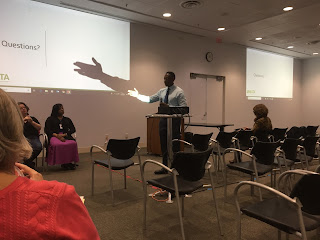MACCD Transportation Summit highlights correct information about MATAplus

At the Memphis Advisory Council for Citizens with Disabilities Transportation Summit, MATA announced that the thirty-minute window follows the scheduled pick-up time. Anthony Amos of MATA referred to the new Rider’s Guide that is online that corrects the previous misinformation that there was a thirty-minute window before and a thirty-minute window after the scheduled time.
The Memphis Center for Independent Living had noted that the misinformation in the previous Rider’s Guide was confusing and preventing people with disabilities from understanding and using the system. This past December, MCIL had a blog article about the misinformation in the Rider’s Guide. Read Stephen Tennial’s piece: https://mciljournal.blogspot.com/2019/12/the-mata-30-minute-window.html
Now the guide reads:
Customers must be ready to depart at any time during the thirty (30) minute window which starts after your scheduled pick up time.
The MACCD event at the Memphis Public Library was lightly attended and began with a presentation from MATA and included Shelby County Mayor Lee Harris pitching for MACCD to support a $10,000,000.00 County investment in public transportation. There were a dozen people at the event that was set up for about 120 people. The sponsors of the event did not seem to attend and there were no vendors.
 MATA began a new functional certification method last year. Mr. Amos said that they are also using the functional assessment for recertifications but hope that they will not face a wave of certifications at their paratransit assessment center. He said that at one point, MATA had nine-thousand people certified for MATAplus.
MATA began a new functional certification method last year. Mr. Amos said that they are also using the functional assessment for recertifications but hope that they will not face a wave of certifications at their paratransit assessment center. He said that at one point, MATA had nine-thousand people certified for MATAplus.
News Release SOCIAL SECURITY
The Social Security Administration launched a new Public Service Announcement (PSA) campaign to continue warning people about the ongoing nationwide telephone impersonation scheme. The PSAs feature a message from Social Security Commissioner Andrew Saul. Social Security and its Office of the Inspector General (OIG) continue to receive reports about fraudulent phone calls from people falsely claiming to be Social Security employees. The scammers mislead victims into making cash or gift card payments for help with purported identity theft, or to avoid arrest for bogus Social Security number problems.

“I want every American to know that if a suspicious caller states there is a problem with their Social Security number or account, they should hang up and never give the caller money or personal information. People should then go online to oig.ssa.gov to report the scam call to Social Security,” said Commissioner Saul.
People should also be on the lookout for a new version of this scam. Fraudsters are now emailing fake documents in attempts to get people to comply with their demands. Victims have received emails with attached letters and reports that appear to be from Social Security or the OIG. The letters may use official letterhead and government jargon to convince victims they are legitimate; they may also contain misspellings and grammar mistakes.
The new PSA addressing the telephone impersonation scheme is available online at: www.youtube.com/socialsecurity
Social Security employees do occasionally contact people--generally those who have ongoing business with the agency--by telephone for business purposes. However, Social Security employees will never threaten a person, or promise a Social Security benefit approval, or increase, in exchange for information or money. In those cases, the call is fraudulent and people should just hang up.
Generally, the agency mainly calls people who have recently applied for a Social Security benefit, someone who is already receiving payments and requires an update to their record, or a person who has requested a phone call from the agency. If a person is not in one of these situations, they normally would not receive a call from the agency.
Social Security will not:
- Tell you that your Social Security number has been suspended.
- Contact you to demand an immediate payment.
- Ask you for credit or debit card numbers over the phone.
- Require a specific means of debt repayment, like a prepaid debit card, a retail gift card, or cash.
- Demand that you pay a Social Security debt without the ability to appeal the amount you owe.
- Promise a Social Security benefit approval, or increase, in exchange for information or money.
If there is a problem with a person’s Social Security number or record, in most cases Social Security will mail a letter. If a person needs to submit payments to Social Security, the agency will send a letter with instructions and payment options. People should never provide information or payment over the phone or Internet unless they are certain of who is receiving it.
 MATA began a new functional certification method last year. Mr. Amos said that they are also using the functional assessment for recertifications but hope that they will not face a wave of certifications at their paratransit assessment center. He said that at one point, MATA had nine-thousand people certified for MATAplus.
MATA began a new functional certification method last year. Mr. Amos said that they are also using the functional assessment for recertifications but hope that they will not face a wave of certifications at their paratransit assessment center. He said that at one point, MATA had nine-thousand people certified for MATAplus. 


